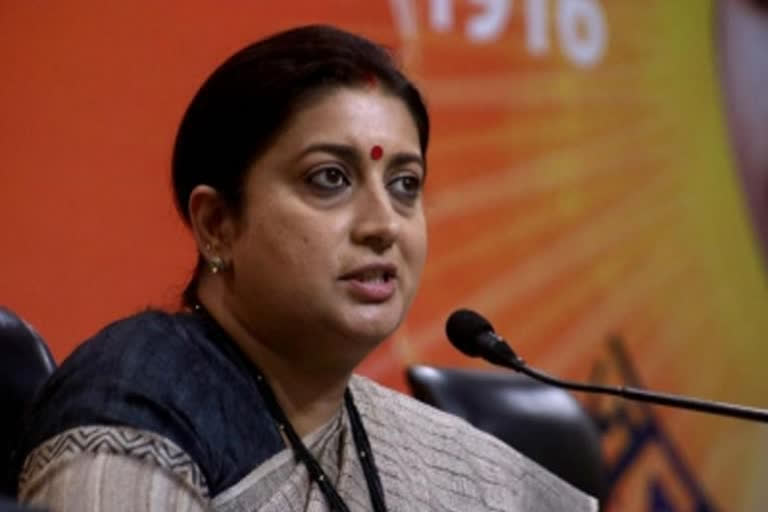New Delhi: Union Minister of Women and Child Development, Smriti Irani, refers to National Crime Records Bureau (NCRB) report titled "Crime In India" in a written reply in Rajya Sabha today.
"Crime In India" compiled state-wise and year-wise data of crimes against women, including domestic violence,
She cites, the NCRB report "Crime In India" reveals that cases registered under the Protection of Women from Domestic Violence Act, 2005,during 2016, 2017, 2018, 2019 and 2020 are 437, 616, 579, 553 and 446, respectively which manifests that there is a decline in a number of cases of domestic violence from 2017 to 2020.
She further added that ‘Police’ and ‘Public Order' are State subjects under the Seventh Schedule, Constitution of India. The responsibility to maintain law and order, protection of life and property of the citizens including investigation and prosecution of crime against women and children rests primarily with the respective State Governments. The State governments are competent to deal with such offences under the extant provisions of law.
Outlining the government's strong stand on the protection of women, she reiterated that the Central Government has undertaken various legislative and schematic interventions in this regard including ‘The Criminal Law (Amendment) Act, 2018’, ‘The Criminal Law (Amendment) Act, 2013’, ‘The Sexual Harassment of Women at Workplace (Prevention, Prohibition and Redressal) Act, 2013’, ‘The Protection of Women from Domestic Violence Act, 2006’, ‘The Dowry Prohibition Act, 1961 etc.
Though her statements reflect a small decline in violence against women which is also evident in the National Family Health Survey(NFHS-5) report which highlights the proportion of married women (between 18-49 years of age) who have ever faced spousal violence has decreased from 31.2% (NFHS-4) to 29.3% but there are few states which have recorded a huge spike in violence against women which is extremely daunting.
Similarly, The proportion of married women (between 18-49 years of age) who have ever faced spousal violence during pregnancy has decreased from 3.9% (NFHS-4) to 3.1%.
In the five states which include Karnataka, Manipur, Telangana, Assam, and Andhra Pradesh, the proportion of married women (between 18-49 years of age) who have ever faced spousal violence has increased which indicates that India still has to do a lot in order to bring and enforce an egalitarian society.
In Karnataka, violence against women has doubled, from 21% to 44%. More than a third of the married women face spousal violence in Karnataka (44%), Bihar (40%), Manipur (40%), and Telangana (37%), and Andhra Pradesh (30%).
The data (NFHS-5) reveals that over 30% of women suffered physical and sexual violence in these five out of 22 surveyed states.
As compared to the NFHS-4 report, a total of seven states and UT's out of the 22 surveyed reported a spike in domestic violence faced by women aged 18-49 years. These seven states include Assam, Himachal Pradesh, Sikkim, Jammu & Kashmir, Ladakh, Maharashtra, Sikkim, and Karnataka.
Although, there is a slight decline in such cases one cannot ignore the fact that women in India still face such abuses both at home and at the workplace.
In addition, the Ministry of Women and Child Development and the Ministry of Home Affairs have issued advisories to States/ UTs from time to time on various issues pertaining to the safety and security of women and children.
Further, in the wake of the Covid-19 pandemic, the Central Government has ensured that all the institutions under its schemes such as One Stop Centres, Women and Child Help Lines, Ujjawala Homes, Swadhar Grehs, Child Care Institutions, as well the various statutory authorities under laws such as “The Protection of Women from Domestic Violence Act, 2005”, “The Dowry Prohibition Act, 1961’, “The Prohibition of Child Marriage Act, 2006”, “The Juvenile Justice (Care and Protection of Children) Act, 2015” etc. remain operational and available to assist women and children facing violence or in distress.
Further, the National Commission for Women and the National Commission for Protection of Child Rights have also taken various measures to assist women and children since the first lockdown, she said.
Also Read: Scheme to support Covid orphans received over 5,000 applications for help: WCD Ministry


